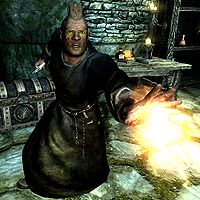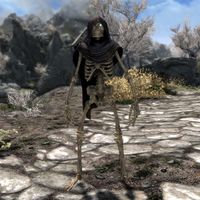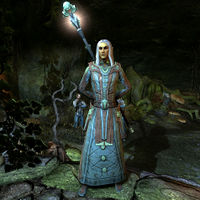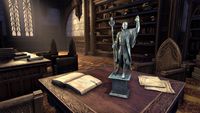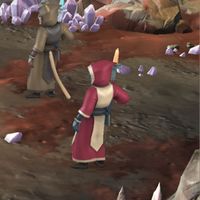Lore:Warlocks
Warlocks are individuals who, similarly to witches, have entered into a pact or oath with Daedra Lords or Daedric Princes, typically of the House of Troubles.[1] However, there are also warlocks who are associated with the Good Daedra, such as Boethiah.[2] In exchange for their loyalty and service, warlocks were known to receive knowledge and supernatural abilities from their Daedric patrons.[1] Warlocks are known to engage in various dark and dangerous forms of sorcery.[3] They possessed considerable expertise in the art of summoning Daedric Princes,[1][4] and were known to form cults.[5][4][6] Their actions were frequently subject to prosecution under the laws of both the Tribunal Temple and the Imperial legal system, as well as other groups such as witchhunters.[7][8]
Warlocks, just like witches, gathered during the Witches Festival to create or summon dangerous creatures.[9][10] Warlocks were known to craft necromantic objects in preparation for the Witches Festival.[11] Plunder skulls, associated with the festival,[12] were objects of particular interest to them.[13] They were known for their practice of utilizing familiars, magical creatures bound to serve them, atronachs, and casting malevolent hexes, invoking curses and spells to bring misfortune upon their adversaries.[14][15] The excavation of ammonites experienced a significant surge during the 1E 2800s, fueled by the fashion among Nibenese warlocks.[16]
These warlocks should not be confused with Warlocks of the Mages Guild,[17][18] a rank within the faction, positioned above Magician but below Wizard, which granted certain privileges.[19][20][21] Some Dremora are also referred to as warlocks.[22]
Arcanists are mages who draw their powers from Apocrypha. Although both Warlocks and Arcanists draw their powers from Oblivion they are different from each other. One significant difference is that Arcanists, by definition, exclusively draw their power from Apocrypha through a bonded tome. In contrast, Warlocks can draw power from otherworldly sources, although the specifics of how they acquire these powers from their patrons may vary and are often unclear. According to Azandar al-Cybiades, any mortal who derives their power from a plane other than Apocrypha would not be classified as an arcanist.[23]
Gallery[edit]
Notes[edit]
See Also[edit]
References[edit]
- ^ a b c my trade dialogue topic in Morrowind
- ^ The Rite of Boethiah's Gauntlet — Thendaramur Death-Blossom, Boethiah's Conduit of Sutch
- ^ Teldryn Sero's dialogue in Skyrim: Dragonborn
- ^ a b Invocation of Azura — Sigillah Parate
- ^ Sinnammu Mirpal's dialogue in Morrowind
- ^ Worm Cult Warlock in ESO
- ^ The House of Troubles
- ^ Witchhunter class description in Morrowind
- ^ Witches Festival holiday description in Daggerfall
- ^ Witches' Festival holiday description in Arena
- ^ Reaper's Harvest Crate description in ESO
- ^ On Plunder Skulls
- ^ Witch's Festival, Plunder Skulls item description in ESO
- ^ Warlock greetings in Arena
- ^ Frost Atronach Kagouti's mount description in ESO
- ^ Systres History: Volume 6 — Trilam Heladren, Associate Dean of Eltheric History, University of Gwylim
- ^ Warlock Carindon's dialogue in ESO
- ^ Ajira's dialogue in Morrowind
- ^ Mages Guild in Morrowind
- ^ Mages Guild in Oblivion
- ^ Raminus Polus' dialogue in Oblivion
- ^ Dremora in Blades
- ^ Loremaster's Archive - The Arcanists — Azandar al-Cybiades
- ^ Varieties of Faith... — Brother Mikhael Karkuxor of the Imperial College

